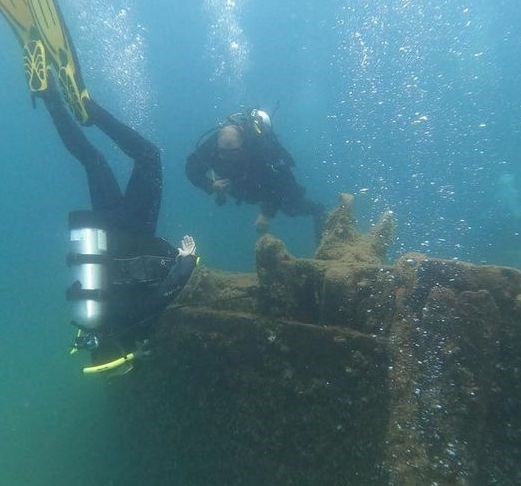After more than three decades working jobs that kept his feet firmly on dry land, Dave Davison is finally living his best life.
Davison, who purchased a dive shop just north of Barrie three years ago called Barrie Scuba House, started diving 35 years ago after a friend, who was also a scuba diving instructor, talked him into trying it out for the first time.
He was hooked and ended up briefly pursuing a career as an instructor himself in the Dominican Republic. After returning home, Davison ultimately felt there wasn’t a big future as a scuba diving instructor in Canada and ended up following a different path — including seven years as a police officer as well as many years in the construction industry.
It’s taken a long time to get to this place, but Davison says he is finally doing what he believes he was always meant to do.
“I love what I do now. I should’ve been doing this for 35 years. The smartest move I’ve ever made was three years ago when I bought this place," he says.
Davison now spends his days either in the pool teaching others to dive and preparing them for open water, or out on his own adventures, looking for wrecks nearby.
Locally, Davison tells BarrieToday that Shanty Bay has the best diving locations in Kempenfelt Bay, but admitted getting there can sometimes be a challenge due to municipal parking restrictions.
“There are quite a few modern-day wrecks down there. People have sunk boats just for fun and now we can dive on them. You can easily get down to 110 feet there," he says.
The downside is it’s very cold and very dark.
“The first 60 feet in there is very, very murky. You can’t see anything and if you don’t know your way around down there you’re not going to know where you are. If you know where you’re going and you get down to 60 feet, once you’ve passed that point, it is crystal clear water,” Davison says. “It’s insanely clear, but very cold.”
Davison described the experience as being similar to looking up at a cloud above you.
“It’s just white. You have no perception of how deep you are. It doesn’t bother me but some divers find that eerie and don’t like it because you have no idea where the surface is,” he says. “There is nothing to see down there except zebra mussels, the odd fish, some bass and some boats that some people have sunk down there.”
If he’s looking for a bit more of a road trip, Davison says he will head to Georgian Bay, where the water is clearer and there is much less traffic in the waters — or even farther afield to Wiarton or Tobermory.
Davison particularly enjoys diving three wrecks located in the waters near Christian Island, including The Maple Dawn, The Marquette and The Michigan, which are described as being relatively “easy” dives that take explorers down approximately 35 feet and has excellent visibility.
“They’re great wrecks to dive, especially for new divers who are trying to experience wrecks, clear water and where it’s fairly safe. Those are great spots,” he says.
Davison says although he tends to dive the same spots multiple times, he's always excited at the possibility of discovering something new each time.
“I go out on dives and people ask what I am going to look for. I just look between the rocks and here and there and the odd time you find something,” he says. “I found an old shipwreck about two months ago that no one’s ever found before… or no one has at least never talked about before.
"It was a very old, burnt-out ship and I have no idea the identity of it or any history on it, because I can’t find anything on it in any shipwreck books. That’s what I go out for, which is just to have fun.”
Diving in Canada is quite different than where he got his start, but he still enjoys every minute of it.
“Canadian waters are cold, so we wear special gear for it. What you see here are some beautiful wrecks, because they’re preserved so well because of the cold, cold waters, (but) that inherently brings different dangers than what you’d face if diving in warmer climates."
Regulators can freeze open and divers need to think about thermal protection during dives in Canadian waters, Davison notes.
“Those are problems that can occur during a dive in Canada. There’s definitely less to worry about in warmer waters, so your comfort level can be a lot higher and you can enjoy it more,” he says. “Here, if you’re trained for it, and I love to dive here, but there’s more fish, etc., to see down south or in the Caribbean.”
When he isn’t out exploring, Davison enjoys teaching others, and is beginning to focus on teaching more on technical diving skills, which often means exploring deeper waters.
“In the GTA, there are very few technical instructors, so I am trying to grow that. My goal is to grow the industry in this area into more advanced technical divers and more professional divers that can explore, go out and have fun and dive wrecks," he says.
"It doesn’t necessarily mean deep, it just means a little bit more advanced as far as diving is concerned."



